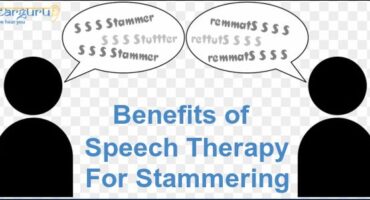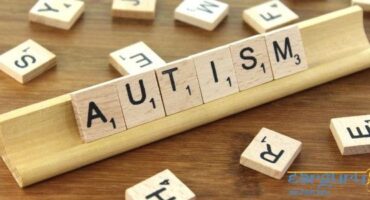Yaashna Rajani Haryani BASLP, MASLP
Our body is an amazing machine as it performs various complex functions with relative ease and also adheres to a biological pattern. Our physical and behavioral traits depend on our parents as we inherit their genes. Chromosomes are molecules which contain the genes that we inherit.
Every human being has 46 chromosomes, at times, due to some abnormality or genetic disorder some babies are born with an extra chromosome. Babies born with an extra chromosome suffer from Down syndrome or Trisomy 21. Speech therapy for Down syndrome is highly recommended as the children have communication issues which can be successfully addressed by a Speech therapist.
Table of Contents
- What is Down Syndrome?
- What Are The Common Symptoms Of Down Syndrome?
- How Can A Speech Therapist Help A Child With Down Syndrome?
- What Is Early Intervention?
- Why Do We Need Speech Therapy for Down Syndrome?
- How Does Down Syndrome Affect Speech Production And Language Skills?
- How Do You Teach A Down Syndrome Child To Talk?
- How Do You Teach A Down Syndrome Child To Communicate?
- Other Related Recommended Speech Therapy Exercise For Down Syndrome
- How Does Articulation As Speech Therapy Exercise Help Children With Down Syndrome?
What is Down Syndrome?
Downs Syndrome is a genetic disorder. It is commonly known as Trisomy 21. Down syndrome is due to a genetic condition in which there is an extra copy of a specific chromosome 21.
What Are The Common Symptoms Of Down Syndrome?
The symptoms of a Down syndrome baby include developmental and intellectual disabilities. The range is from mild to severe and the profile varies with each individual.
Children with Down syndrome can be easily identified due to their distinct facial features. The following features are common indicators but everyone may not necessarily have the same features or symptoms as there are different levels of severity of Down syndrome.
- Short neck
- High arched palate
- Protruding tongue
- Small head
- Upward slanting eyelids (palpebral fissures)
- Unusually shaped or small ears
- Poor muscle tone
- Short hands, normally broad with only one crease in the palm
- Excessive flexibility
- Brushfield’s Spots. These are very tiny white spots found on the iris of the eye
- Short height
At times, children with Down syndrome also suffer from the following conditions:
- Heart defects
- Intestinal problems
- Vision and hearing problems
- Thyroid problems
How Can A Speech Therapist Help A Child With Down Syndrome?
A speech language pathologist carries out an assessment to help identify the areas in which the child is facing difficulty. These include receptive language skills, expressive language skills, play skills, social skills, semantics, syntax, articulation skills, oral motor planning and Oro-motor strengthening skills.
Based on the evaluation, the Speech Therapist will make a treatment plan to target the areas wherever the child is facing difficulties. This is generally done in the form of one on one therapy or group therapy sessions.
What Is Early Intervention?
Down syndrome is a developmental disorder. The initial years of the child’s life are very crucial for development. Any remedy provided during the initial years helps the child to bridge the gaps in the developmental delay. Children with Down syndrome experience delays in various areas and hence early intervention is highly recommended.
Physiotherapy, occupational therapy and speech therapy exercises for children are the common treatments for Down syndrome.
What is Speech, Language and Communication?
Understanding the difference in speech, language and communication is an important factor. Many times these terms are interchangeably used. Communication, by definition, is the process in which there is an exchange of information. It can be by way of speaking, writing or using some other medium. In simple words, it is the exchange of thoughts and ideas.
Language is basically a commonly used and accepted method or system of communication between human beings. It can be either spoken or written and mainly consists of the use of words in a structured and conventional way. Speech is considered as the vocalized form of communication (i.e. spoken words).
Thus it is very important to remember that the goal is not always speech but mainly communication. The speech therapist ensures that people with Down syndrome communicate effectively.
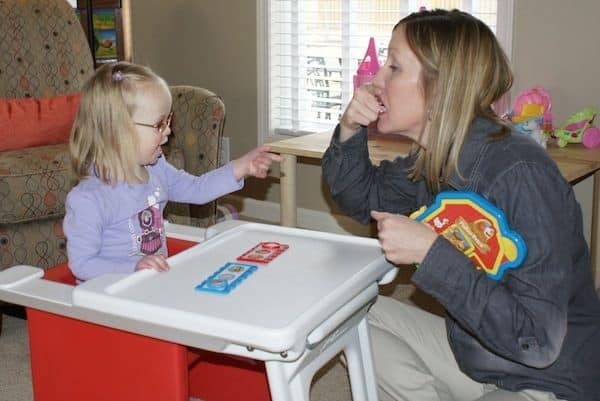
Why Do We Need Speech Therapy for Down Syndrome?
Children with Down syndrome often have difficulties with their speech, language and communication skills. It is noticed that some children with Down syndrome start gesturing and using signs to communicate before they learn to use speech. This is basically the development of non-verbal skills before the use of verbal skills for communication. They also face some difficulty with speech clarity and overall speech. Language skills in children with Down syndrome are often delayed, and hence there is a need for speech therapy for Down syndrome and it plays an important role in the child’s speech and language development.
How Does Down Syndrome Affect Speech Production And Language Skills?
Children with Down syndrome also suffer from the following disabilities which affect speech production and language development
- Cognitive development or the ability of the child to think and react to situations
- Hearing loss
- Decreased muscle tone, strength and coordination in mouth and throat
How Do You Teach A Down Syndrome Child To Talk?
There are many pre- requites and pre-linguistic skills which are to be achieved and worked on before the child can learn to speak.
The following skills are desirable to obtain good results in Speech therapy for Down syndrome.
- Means to end (the ability to achieve an object/ goal by some means)
- Attending (eg turns head in response to a sound in the environment)
- Imitation of vocal behaviour (repeating sounds and words eg gaga, mama, bye)
- Use of object (uses the spoon for eating / stirring)
- Object permanence (The ability to understand that even though an object is not present and cannot be felt or heard, but it still exists)
- Visual attention (look at the speaker, look at objects)
- Auditory skills (listening to language, music, etc. for increasingly longer times)
- Cognitive skills (understanding cause and effect relationships, object permanence)
- Social skills (turn-taking, such as peek-a-boo or rolling a ball back and forth)
- Play skills (playing meaningfully with toys)
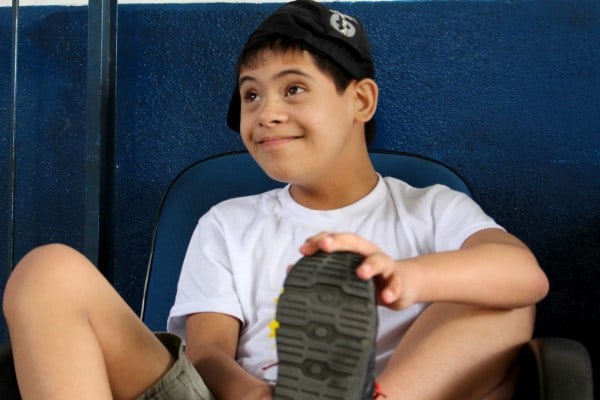
What Is A Total Communication Approach?
In speech therapy for Down syndrome, many a time speech therapists follow the total communication approach, which means a combination of verbal and non-verbal means to help the child improve his or her communication skills. These include speech, sign language, gestures, pictures and / or communication aids.
As mentioned earlier, children with Down syndrome often develop non- verbal communication before verbal communication, thus a total communication approach helps even more.
How Do You Teach A Down Syndrome Child To Communicate?
Use of basic Makaton signs including signs for more, finished, give me, and help. It is observed that using sign language with speech shows an increase in understanding and also offers the child an additional method for expression. Remember to pair the sign with verbal expression of objects, people and actions.
Provide your child with additional visual input by pointing to objects and/or pictures that you are describing as you speak.
Will Using A Total Communication Approach Delay My Child’s Speech Development?
Many studies have been commissioned to get a better understanding of this issue has shown that a total communication approach does not slow down speech development. In fact, most of the studies showed that a total communication approach increased speech production.
Basic Tips For Total Communication Approach
Provide a speech and language enriching and stimulating environment to your child. There are many activities in day to day routine that can be opportunities for you to provide speech and language skills to your child. Bath time can be used for labeling various objects like
- Water
- Shampoo
- Bucket
- Labeling actions like washing
- Pouring
- You can even add adjectives and get bath books
- You can also use the time for brushing, changing clothes and eating meals etc
- Play interactive games like peek-a-boo, pat-a-cake and bubbles.
- Comment on sounds in your environment (e.g., doorbell, ice clinking in a glass, dog barking, etc.) to increase your child’s auditory awareness
- Model speech for your child in every situation e.g. if the child brings a glass/ bottle of water to you, you can make the child tap your hand and you can model (emphasise lip movement) “Mumma water” for your child.
- Follow your child’s lead. When the child picks up a toy, as a parent you should also engage in the same toy and provide modelling and language input and play along with the child.
- Expand on your childs utterances eg. if the child says “give me the ball” you can expand by saying “give me the red ball.”
- Respond positively to all attempts at communication (“Oh you signed more! More what? Do you want to play the ball more? Once the child begins to attempt to say or sign the words you are modelling for him / her, you must praise them for their efforts, eg. “Oh that’s good”
Does Singing Help In Speech Therapy For Down Syndrome?
Singing is another good opportunity to improve the Childs speech and language skills. You can encourage the child to fill in words, gestures and sound effects.
Remember to be face to face with the child and use facial expressions to engage the child better. Also singing slowly and pausing allows your child to really hear the words and fill in. Also, use actions and gestures.
You can also make up songs for your daily routine.
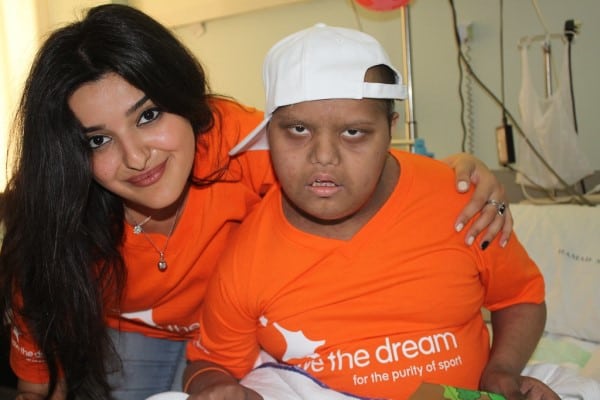
How Does Play Help The Child With Down Syndrome?
Play is a great opportunity to promote speech and language skills. Engage the child in anticipatory games like ready, set and go. Using functional objects within play also helps.
Pretend play can be used to expand your Childs speech and language skills. Toys which can be used for the same include:
- Dolls with accessories
- Kitchen/ cooking items/ foods
- Workbench/ tool kit
- School bus and other vehicles
- Farmhouse with animals
- Dollhouse or garage
- House cleaning set
- Toy telephone
- Doctor kit
Play can also help to promote motor and verbal imitation and encourage command following and social skills like taking turns.
How Do Books Help The Child With Down Syndrome?
Reading word and wordless books help improve the Childs speech and language skills. The idea is not just to read the story but to engage the child, try and use books with more pictures and less text. Act out the characters in the story by animating or changing your voice, hand movements and facial expressions. This will keep the child engrossed and attentive and increase his interest in the storybook.
Ensure that your child is pro-active and interacts by identifying pictures. Encourage your child to choose the storybook he likes, let him or her remove the book from the shelf, go to the right page and turn the pages as the story progresses. When the child repeatedly picks up the book he likes and is familiar with the story, you should pause mid-sentence while story-telling and encourage him/her to finish the sentence. The child can finish the sentence on his/her own using a mix of gestures, words and sounds
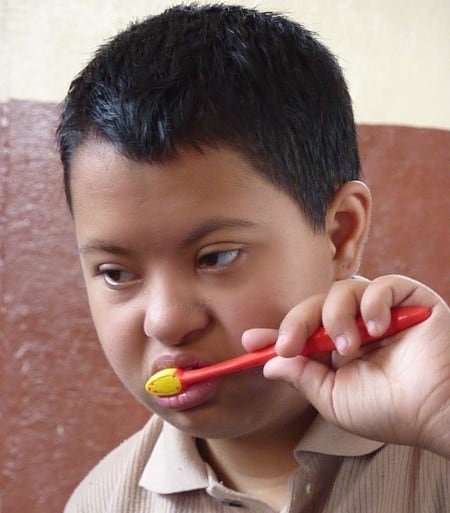
Other Related Recommended Speech Therapy Exercise For Down Syndrome
- Take pictures of your Child’s items and things they see in their environment, encourage them to point to those items.
- The pictures can be of their preferred food, a favourite toy or other items in their surroundings
- Point to the pictures as you talk about or show the objects to help build your child’s understanding of symbols. When you are talking about an object make sure you point to it if in a book and/ or show the real object to help the child associate the word to the object.
- Show two pictures to give a choice between activities (“Do you want to play ball or play with your toy cars?”)
- Make a book of pictures of daily activities and objects that your child can use to make choices or talk about the day
- Make a visual schedule for everyday routines (e.g. wake-up, use the bathroom, get dressed, eat breakfast, brush teeth, playtime)
Speech Therapy For Down Syndrome To Improve Muscular Strength
Children with Down syndrome often exhibit low muscle tone and hence Speech Language Pathologists suggest Oro-motor Exercises for the same. Especially the tongue movements, many a time the movements are sluggish and thus the speech shows imprecise pronunciations. The tongue of children with Down syndrome appears thick and slightly larger in size and many a time tongue thrust (see footnote for details) is observed.
The following activities help to develop tongue strength and mobility.
- Encourage your child to lick food substances from a spoon
- Offer them lollipops and encourage the child to lick it.
- Place food on the child’s lips and encourage him/her to lick the food.
- Encourage the child to blow hard, for e.g. difficult-to-blow whistles, party horns and continuous blowing, e.g. bubbles.
- Straw-drinking with long, thin straws and thickened liquids, for e.g. juices, smoothies, milkshakes.
- Put small pieces of easy to melt jelly sweets in the child’s mouth, push the sweets towards the cheeks.
- Pull faces in the mirror – encourage your child to copy you or make them move their tongue up and down and side to side.
How Does Articulation As Speech Therapy Exercise Help Children With Down Syndrome?
In children with Down syndrome articulation or clarity of speech is often affected. The Speech Therapist carries out a detailed articulation assessment to find out the error in sounds, the types of errors and the position of the sound in error. Based on the evaluation results, the pathologist starts the therapy. Sounds are initially targeted in the isolation level followed by syllables, words and then phrases, sentences and regular conversation.
Below Are Some Tips To Work On Articulation
- Make sure your child can see your mouth when you speak; the child needs to understand the placement in order to produce the correct sound.
- Model clear articulation: When modelling speech for a child with downs syndrome we need to remember to articulate each sound correctly and slowly.
- Using a mirror in the therapy session will greatly help the child with articulation. By looking into the mirror, the child notices the exact position of the tongue, lips, and teeth. The child makes use of the mirror to observe the mouth and repeats the exercise until he can produce the correct sound and words.
- You can help the child by providing auditory, visual and tactile cues for the same.
You can also play games like:
- Rolling the dice and saying the target words that many numbers of times.
- Draw small squares on a piece of paper and colour them or cross them out after you have mentioned the word.
- Take turns blowing bubbles. Have your child say one of their words before their turn to blow the bubbles.
- Treasure hunt using the target words
- Fishing game with target word sounds.
Speech Therapy for Down Syndrome is a highly recommended approach to improve the communication skills of the child. Parents are advised to approach a Speech Language Pathologist for a proper evaluation and assessment.
Important Information for Parents:
Parents seeking consultation and advise can contact Ms. Yaashna Rajani Haryani by mentioning your contact details here or in the comments section below for a free consultation.
Tongue thrust (also called “reverse” or “immature” swallow is the common name given to oro-facial muscular imbalance, a human behavioural pattern in which the tongue protrudes through the anterior incisors during swallowing, speech and while the tongue is at rest.
References:
- https://www.ndss.org/resources/early-intervention/
- https://www.cdc.gov/ncbddd/birthdefects/downsyndrome.html
- https://blog.asha.org/2011/02/25/tongue-thrust-and-treatment-of-subsequent-articulation-disorders/
About the Author


